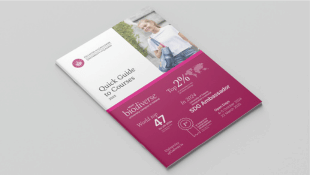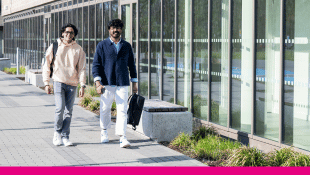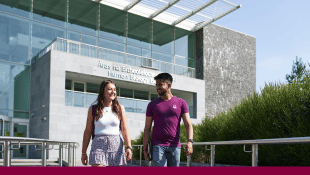-
Courses

Courses
Choosing a course is one of the most important decisions you'll ever make! View our courses and see what our students and lecturers have to say about the courses you are interested in at the links below.
-
University Life

University Life
Each year more than 4,000 choose University of Galway as their University of choice. Find out what life at University of Galway is all about here.
-
About University of Galway

About University of Galway
Since 1845, University of Galway has been sharing the highest quality teaching and research with Ireland and the world. Find out what makes our University so special – from our distinguished history to the latest news and campus developments.
-
Colleges & Schools

Colleges & Schools
University of Galway has earned international recognition as a research-led university with a commitment to top quality teaching across a range of key areas of expertise.
-
Research & Innovation

Research & Innovation
University of Galway’s vibrant research community take on some of the most pressing challenges of our times.
-
Business & Industry

Guiding Breakthrough Research at University of Galway
We explore and facilitate commercial opportunities for the research community at University of Galway, as well as facilitating industry partnership.
-
Alumni & Friends

Alumni & Friends
There are 128,000 University of Galway alumni worldwide. Stay connected to your alumni community! Join our social networks and update your details online.
-
Community Engagement

Community Engagement
At University of Galway, we believe that the best learning takes place when you apply what you learn in a real world context. That's why many of our courses include work placements or community projects.
Staff Mobility - Training
Erasmus+ Staff Mobility
Notice on Staff Mobility – September 2025 Staff mobility processes are currently under review. This page will be updated with revised procedures and a new application process as soon as these are available.
Please note: All applications are paused until further notice. We encourage you to check back for the latest updates.
Training via the Erasmus Programme for university staff at enterprises and HEIs abroad - General Information
The Erasmus+ Programme includes grants for short visits by university staff to enterprises or Higher Education Institutions (HEIs) in other participating countries (i.e. EU member states, Norway, Iceland, Liechtenstein, Serbia, Turkey and the Republic of North Macedonia) for the purposes of training. This scheme is open to all categories of staff employed by the University: administrative, technical, research and academic.
This mobility scheme aims to allow staff of HEIs to acquire knowledge or specific know-how from experiences and good practices abroad, as well as practical skills relevant for their current job and their professional development. Activities that may be considered eligible would include official training courses/programmes, training programmes tailored to individual needs, job-shadowing, or workshops with a focus on training.
There should be some demonstrable justification for travelling abroad to engage in the proposed training, i.e. funding will generally not be granted for attending training courses abroad where similar courses are available in Ireland. Research collaboration activities are NOT eligible for funding under this scheme, nor is attendance at conferences. Please note that the grant includes an allowance for travel and subsistence, but it does not cover course fees: staff members would have to meet this type of cost themselves.
University of Galway's funding for staff training mobility will cover only a limited number of visits. The minimum duration of these training visits is 2 full working days, and regrettably it will not be possible for us to support visits in excess of five working days.
Erasmus opportunities for Administrative Staff
Erasmus Staff Training Weeks at partner European Higher Education Institutions
Please note - Applications for Erasmus grant funding to cover costs of attending staff weeks are currently paused. Please check back for updates and details on the new processes.
The Erasmus Programme now contains provision for short visits by university staff to enterprises or Higher Education Institutions (HEIs) in other participating countries (i.e. EU member states, plus Norway, Iceland, Liechtenstein, Serbia, Turkey and the Republic of North Macedonia) for the purposes of training. The objective of this type of staff mobility is to allow staff of HEIs to acquire knowledge or specific know-how from experiences and good practices abroad, as well as practical skills relevant for their current job and their professional development. The stay in the partner organisation can be termed a short secondment period, job-shadowing scheme, study visit or workshop.
European universities sometime run “Staff Training Weeks” which are open to administrative staff and would qualify under the above-mentioned scheme. Such opportunities are almost always listed in the IMOTION database.
For any formal Staff Training Weeks, interested staff should complete the Draft Staff Mobility Training Agreement that can be found on the main Staff Mobility page and submit it to the International Affairs Office, noting the deadline indicated. If you find a suitable training week after the deadline, it may be worth making an enquiry, because funding does sometimes get freed up in the course of the year. Please note, however, that we will only ever be able to fund about 10 visits in total per year, due to the limited financial resources available for this scheme.
It is also important to note that approval of a staff member's Erasmus funding application by University of Galway's International Office does not imply a guarantee that they would get a place on the particular course. You would make a separate application to the host institution and it would be for the host institution to select participants; often they receive a large number of applications and may even use a lottery to allocate places. You would, of course, have the possibility of applying first to the host institution by filling in a registration form, but if you are not approved for Erasmus funding from University of Galway then you would then have to meet all costs yourself if you decided to accept a place on the course. We will, of course, endeavour to inform candidates as soon as possible about the outcome of their application for Erasmus funding.
Please note that administrative staff are also eligible to apply for an independently-organised training visit to a HEI in one of the named countries, i.e. where the staff member makes contact with a counterpart in another university and arranges a programme of training/job-shadowing. Please make sure to read the information on the main Staff Mobility page.
Downloads
-

Undergraduate Prospectus 2026 PDF (12.4MB)
-

Postgraduate Prospectus 2026 PDF (3.2MB)
-

Quick Guide to Courses 2026 PDF (1.20MB)
-

A-Level Quick Guide to Courses 2025 PDF (1.04MB)
-

Pre-Arrival Guide 2025 PDF (1.6 MB)
-
.png)
Brazil Student Guide PDF (3.2 MB)
-
.png)
Chile Student Guide PDF (3.1 MB)
-
.png)
Colombia Student Guide PDF (3.1 MB)
-
.png)
Ghana Student Guide PDF (3.4 MB)
-

Hong Kong Student Guide PDF (3.6 MB)
-

Indian Student Guide PDF (3.5 MB)
-
.png)
Indonesian Student Guide PDF (3.2 MB)
-

Malaysian Student Guide PDF (3.6 MB)
-
.png)
Mexico Student Guide PDF (3.1 MB)
-

Nigeria Student Guide PDF (3.4 MB)
-
.png)
North American Student Guide PDF (2.9 MB)
-
.png)
Panama Student Guide PDF (3.1 MB)
-

South African Student Guide PDF (3.7 MB)
-
.png)
Taiwan Student Guide PDF (4.0 MB)
-
.png)
Thailand Student Guide PDF (3.6 MB)
-
.png)
Turkish Student Guide PDF (4.2 MB)
-
.png)
UAE Student Guide PDF (3.4 MB)
-
.png)
Vietnam Student Guide PDF (3.39 MB)















